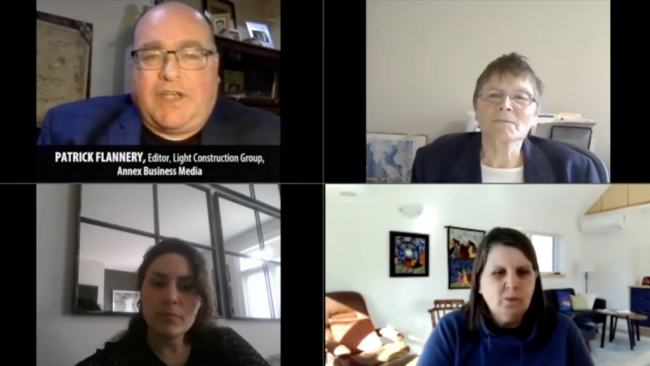
Features
Education & Training
Women In Construction: Driving change in the industry panel discussion
March 18, 2021 By Jay Koblun
 Marg Latham, Stephanie Rota, and Natalie Leonard were joined by editor and panel moderator Pat Flannery on International Women’s Day 2021 for Rock to Road's Women In Construction Virtual Event
Marg Latham, Stephanie Rota, and Natalie Leonard were joined by editor and panel moderator Pat Flannery on International Women’s Day 2021 for Rock to Road's Women In Construction Virtual Event Women continue to drive change in the Canadian construction industry despite still being heavily outnumbered compared to their male counterparts. Three female executives joined a panel on our Women In Construction Virtual Event highlighting women who continue to push for change, challenge the norm, and directly contribute to the success of the industry.
Marg Latham, Stephanie Rota, and Natalie Leonard were joined by editor and panel moderator Pat Flannery on International Women’s Day 2021.
Marg Latham is a professional engineer and certified management consultant. She is president of Aqua Libra Consulting, a management consulting firm. She said she experienced several challenges and barriers when starting her career in construction, but having mentors, allies and supporters helped.

Marg Latham, Stephanie Rota, and Natalie Leonard were joined by editor and panel moderator Pat Flannery on International Women’s Day 2021 for Rock to Road’s Women In Construction Virtual Event.
“There were challenges along the way. I consider myself very fortunate that very early on in my career I worked for a gentleman who became a mentor and sponsor, and that certainly helped me advance in my career and go up the ladder. I can’t say enough about how important it is for women to find allies, mentors, sponsors. When I moved into an executive role, I was the first woman to be a vice-president in that organization.”
Latham added that it still surprised her how her male counterparts in the industry can make mistakes and see them as insignificant, but women don’t get have the same luxury.
“Sometimes you feel when you’re a woman, and you’re the only one there, you’re carrying the whole weight of your gender on your shoulders. Can’t say enough about how important it is for allies and sponsors to be there for you in your workplace,” said Latham.
Stephanie Rota is the CEO of Carmelin Design and Build. She obtained her MBA from the Schulich School of Business and leans on this education in running the business today. Her experience working for a real estate developer gave first-hand exposure to all aspects of a build. With a focus on customer experience, Stephanie ensures clients are informed and consulted on every aspect of the project.
Rota also said it’s important for women in the industry to have support from family.
“My father was actually such a supporter. That is a huge takeaway for me as a parent. To really foster whatever passion your children have. Even if it’s different from your vision. I always had such incredibly supportive parents and I think that is what you would need especially if you are a female entering a historically male-dominated industry. Having that support, or like Marg said, a mentor, is extremely helpful and encouraging.”

Natalie Leonard, P.Eng. Photo: Submitted
Natalie Leonard became Canada’s first certified Passive House consultant and builder more than 10 years ago. Since then, the civil engineer’s company, Passive Design Solutions, has completed more than 100 projects that are net-zero-ready. Along the way, she has also focused on making such homes more easily affordable for the mainstream market.
Leonard said it is important to try to change the way the system is built.
“For me, I was quite fortunate that I didn’t grow up in a family that had a lot of gender roles,” she said. Adding that her father was a general contractor and growing up she and her siblings had to all contribute to jobs and chores around the house.
“Had to kind of do everything. Pitch in regardless of whether it was my sister or brother or me. I grew up with a fairly strong can-do attitude.
“One thing I noticed is women are always apologizing for their mistakes. If you watch, men just aren’t doing that. I try to kind of emulate that a little bit. Find the solution and move on,” she said.
A work-life balance
Running a company and having a family can be a challenge for either gender, especially during the COVID-19 pandemic. It can leave you in the position of chasing kids around the house while trying to get your work done at the same time. The panellists were asked how much of a challenge that has been and what ways have they felt supported.

Stephanie Rota, CEO, Carmelin Design and Build. Photo: Submitted
“Still figuring out how to cope with it, to be honest,” said Rota. “I think the biggest realization that I’ve come to is it’s OK to be imperfect. It’s OK not to meet your own expectation on a daily basis; you can’t because you’re being pulled in so many directions from your work, obligations, and to your children. And I think for me was the biggest hurdle to overcome.
“When you have your own business, you work really hard and you never get an opportunity to turn it off. Late-night emails. Catching up when kids go to bed. Working on weekends.”
Latham said women can often face different pressures than men do while trying to manage both a career and family.
“I do believe that is the case and especially now in the pandemic. Who are the caregivers? Who are the homeschoolers? Who is looking after the home? Who are trying to work remotely? A lot of women in this industry and other industries,” she said. “Some women work for a decade or two in their career, but the choice is ‘do I continue that or do I support my family at home?’ I think we risk losing the progress we made in the construction industry over the last couple of decades. It really is a lot of pressure for women and it is different for men. It always has been.”
Leonard answered from the perspective that there may be an optimistic trend headed in the other direction.
“Three of my male staff took paternity leave because their wives made more money. I’m starting to see that trickle effect of more women stay in the industry. I hear more things like a father saying he has to leave to go pick up his children from kindergarten, or daycare. I’m optimistic of that. That gender roles are switching a little bit.”
Secret to success
Leonard said what worked for her was having a can-do attitude and being confident in her skills and education.
“The biggest thing is having a can-do attitude and continuously building up your knowledge. Knowing what you’re talking about so you have that credibility. I take an attitude that I can learn something new every day. Construction is more successful if it’s collaborative. The idea of problem-solving together and finding the best solution. The collaborative approach is how I work and I think makes a big difference,” she said.

Marg Latham, P.Eng., CMC. Photo: Submitted
Latham agreed that a can-do attitude is key. “I’ve always been told I have a can-do attitude and that’s what moved me along. When I landed on a construction site as a 20-year-old, I saw all these tradespeople that knew so much about their trade. My curiosity, my desire to learn, opened the door to my being there and being accepted by more than I probably would have been if I had come out with this attitude of ’I’m an engineer I know all.’”
She also said having a sense of humour is necessary at times.
“Also, a sense of humour. Sometimes when it was more out of discomfort than true humour. All of those things helped in the early days. Later on, I think it was persistence, learning, hard work, communication skills and I’d like to think—collaboration.”
Each panellist said they see a positive shift when it comes to women having a place in Canadian construction. When it comes to other countries following suit and being more accepting of female executives, Latham suggested they focus on the benefits it can bring their economies. Culturally, she says it just takes time and keeping the topic in the forefront.
“Where countries have brought women into the workforce, especially if they brought them into a male-dominated workforce, they see what it’s done for their economy. On the cultural side, that’s going to be a tougher thing. It’s rooted in centuries of behaviour. And that’s just not going to change overnight.
“But you look at what happened in this country in the ‘70s, that made a progressive change socially, culturally and economically for this country to get women in the workforce. I would hope viewing that would help other countries see how important it is.”
Addressing difficult conversations and seeking change
The event moderator asked the panellists how a woman would go about talking to their employer about not feeling comfortable in the workplace if something were to come up. Latham said workplaces need to have resources that can point you in the right direction for those situations and make it clear those conversations are welcome.
“Saying, ‘when you say that, you make me feel uncomfortable’ is not an easy conversation to have with anybody, let alone where you are the only woman in a work environment. I think we’ve got a way to go but it certainly has come a long way from when women were totally isolated out there with no resources to find help.
“When I was younger I would have loved to have an advocate. Somebody in the company, workforce, around me, to be able to go to. Today there are resources out there. So, when I hear of women recounting things that are happening, I can point them in a direction where they can go and they can speak to someone, get advice. But they’re still difficult conversations to have. And learning how to have those difficult conversations I think is an important skill set.”
Advice for women looking to join the industry
Latham: “I think the first thing I would say is women do belong in this industry. I think there are more women out there now. Companies are more interested in how to turn their workplaces into more respectful and inclusive ones. Don’t shy away from going into the industry. It’s a great place if you’re passionate about building, creating, working with people, solving problems, putting out fires, managing.
“There are some great careers out there for women and no reason in the world why more women shouldn’t be in the industry.”
Leonard: “For me, it’s an endless series of solving problems. And I like solving problems. I think as an engineer really that’s all your taught is how to solve problems and you learn the actual knowledge in the field. So, things like project management; lots of multi-tasking, communication, collaboration, getting to create things. Those are all things women can excel at.
“Don’t think that the construction industry is just dry technical things.”
Rota: “For women that are looking to get into this industry, reach out to somebody that you want to look up to as a mentor. You’d be surprised if you approach somebody and ask them of their willingness to help you out. I’m available if somebody ever wanted to ask me some questions, send me an email, chat over coffee when we can go to coffee shops again.
“I’m more than willing to help out a fellow female in construction.”
Did you miss or forget to register for our Women In Construction Virtual Event? All of the sessions and keynote presentation are available On Demand here: www.craneandhoistcanada.com/women-in-construction-demand/
Visit, www.women-in-construction.ca to join the conversation, access news, features, and more content focused on celebrating women in construction.
Print this page